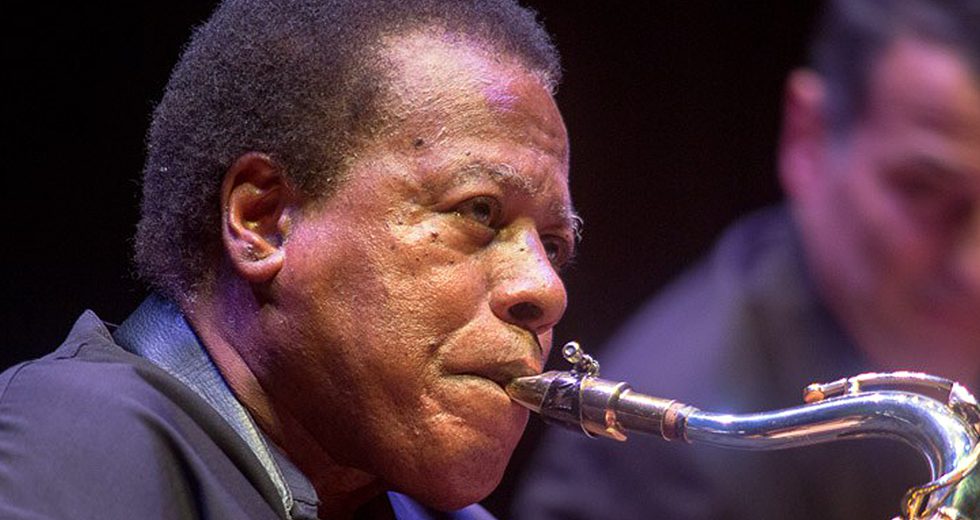
Wayne Shorter was reminiscing about his first gig in Chicago … 1959, at the Cloister Inn, with Art Blakey. June Christy and Anita O’Day sat in with the band and their voices “melted in with the horns.” After their sets, they’d all head up Rush Street to Mr. Kelly’s, Chez Paree or Jilly’s to hear what other bands were doing.
“Such sweeping memories,” Shorter recalled. “Which leads to the question: What is life? What is it all for?”
That’s how one thought follows another when Shorter speaks. And that’s the sort of unexpected turn his audiences can expect when Shorter brings his quartet to Orchestra Hall for a performance May 27 in the SCP Jazz Series.
Shorter was making a point about the importance of listening to other voices: “You investigate. You take it upon yourself to do your homework.”
He has been doing his homework since 1958, when he began jamming with fellow tenor saxophonists John Coltrane and Sonny Rollins, then with the Maynard Ferguson big band, Art Blakey and the Jazz Messengers, Herbie Hancock and Miles Davis. In 1970, he co-founded the jazz fusion group Weather Report, whose evolution continued for nearly a generation.
Along the way to today, he has made a point of working with young artists like bassist-vocalist Esmeralda Spalding, learning and teaching. “They need to question themselves, ‘What do I like about what’s called new?’”
He’s happy to take that exploration beyond what is popular and marketable and even beyond what is “music.”
Shorter circled back to his earlier reminiscences on Chicago’s storied Rush Street jazz scene. Listening to the bands express themselves live and unfiltered, he realized that what he was hearing was not necessarily what was being stocked in jukeboxes or programmed for radio. “You go to Chicago to get educated, not just entertained,” Shorter declared, punctuating with his gravelly vocal rendition of mentor Blakey: “Got to keep your eyes and ears open! Got to keep an open mind!”
He happily notes that his current band — a quartet comprising pianist Danilo Perez, drummer Brian Blade and bassist John Patitucci — is ”wide open.”
“They’re doing their own stuff [solo projects], and when we get together, we keep in mind the mission of taking the road less trodden, not the road crowded with people following each other,” Shorter said. “They have grasped the stuff that people are conditioned not to hear, not to investigate. To go beyond their comfort zones.
“They know that’s the way the world is today, we have to learn and know how to be creative enough and not afraid to negotiate the unexpected,” he said. They do that through the improvisation of jazz.
“If you just do the same thing, over and over again, it’s going to be a minstrel show: easy-listening, non-threatening. … Don’t think about anything but going to the theater and putting your hands in their air.”
Safe to say there won’t be a lot of arm-waving at Symphony Center when Shorter’s quartet plays. The absence of that sort of programmed mass behavior is fine with him. (He jokes about it, saying when he hears someone onstage yell “Put your hands up!” He expects to hear someone in the back add, “This is a stickup!”)
Actually, music seems to be just one point at the intersection of Shorter’s artistic interest and expression. His fascination with science fiction leads him to wonder whether music is the universal language — “the idea that music can bring us together and all that.”
“That’s not necessarily so. Music can push people apart,” he explained. “A universal thing? We’re talking about the universe. The planet we’re on is actually a ship that’s introducing us to all that’s beyond our senses, so let’s try to make music a universal thing that other beings [can appreciate].”
Shorter’s journey of discovery is a lifelong adventure that’s reflected in his orchestrated work. His first composition in 1952 for a concert band at New York University was titled, of course, “Universe.”
His journey continues at age 82. His next recording, which he promises will be released soon, is a collaboration between his quartet and the Orpheus Chamber Orchestra, and it will be packaged with a graphic science-fiction novel. That’s Wayne’s world.
Joe Pixler is a Chicago-based writer and editor.